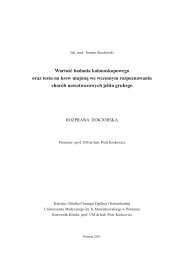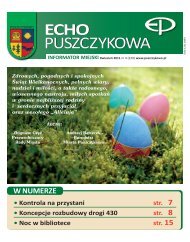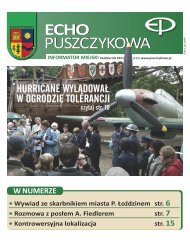MILITARY PHARMACY AND MEDICINE
MILITARY PHARMACY AND MEDICINE
MILITARY PHARMACY AND MEDICINE
Create successful ePaper yourself
Turn your PDF publications into a flip-book with our unique Google optimized e-Paper software.
© Military Pharmacy and Medicine • 2012 • 4 • 107 – 110but also in ethical codes, including the PolishCode of Ethics for Public Relations Associationand the Ethical Code of Journalists.A great example of internal acts referring to therole of communication between the emergency(rescue) services and the media may be internalregulations of the National Fire Service of 1998,defining press-information activity within theNFS structures, including the actions of spokespersonsand cooperation between NFS andjournalists during crisis situations. In 2004, theHeadquarters of the National Fire Service establishedprinciples of proper conduct for the commandingofficer during a rescue operation. Theabove-mentioned guidelines categorically forbidthe commanding officer to inform the mediain the event place about the reasons, identitydata and names of casualties. Guidelines alsoclearly define the way of taking over informationalfunction by a person appointed to a postof a spokesperson.Appointment of spokespersonsŁukasz Szarpak: Selected aspects of communication between emergency services …media about progression of rescue actions fromthe onset of crisis. Such a person should be chosenmuch earlier and systematically prepared forhis/her role, since in order to increase the level ofreliability of the released statement, the speakermust show competence, enjoy respect, be reliableand dynamic, and enjoy a positive opinion. Sucha person should have several crucial abilities:••must be resistant to stress and control his/herown emotions;••must have extensive substantive knowledgeabout activities of the emergency servicesand know the services which he/she is talkingabout;••must have great interpersonal abilities andmake contact easily.Professional actions of a spokesperson build uptrust of the media in emergency services andstrengthen positive public opinion about theirhard work [16]. Thus, it is so important to obeythe rules defining what a spokesperson should orshould not do.A deficit of information is commonly associatedwith crisis situations. From a point ofview of the media, a crisis situation is a specialopportunity to develop their own image amongmedia market participants while gaining asmuch information as possible and reporting itto the public [15] . In order to avoid informationchaos, it is important to take actions whichguarantee that statements issued by all personsauthorised to convey information are consistent,relevant and answer the questions insteadof ignoring them using a phrase “no comments”.A requirement of consistent communication isone of the most important elements connectedwith the entire management of communicationin crisis situations. Consistency is necessaryfor information exchange between particularemergency services, organizations and themedia. Therefore, it seems important to developa strategy of communication with both internal(services) and external (media and publicopinion) environment.Misinterpretation of the event is a commonaction taken by the media, which results fromshortage of information or conflicting datapresented to the public. Thus, it is essential toappoint a person who will solely inform thehttp://military.isl-journals.comTable 1: Principles of spokesperson’s work.AllowedRelease information onlyvia a press spokespersonresponsible for public relations.Not allowedSpeculate on:••possible causes of thecrisis situation;••number of fatalities;••further scenarios of events;••date of termination of theactions.Provide information thatCreate equal opportunities to can hinder the progress ofobtain information by various rescue operations, raisetypes of media.panic or bring about any newthreat.Release only proven informationSupervise information outflowby:••own, frequent contacts withthe media;••collecting all information ina version reported by themedia to the public;••controlling movement ofjournalists in the endangeredarea.Issue official statements toincompetent personsEvaluate rescue operationswhen they are in progress.Lay the blame for the situationon anyone.Misinform the media.107
















